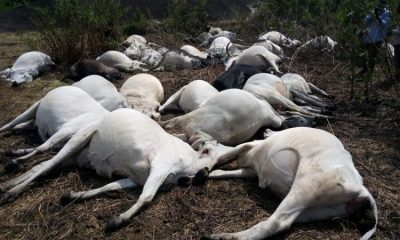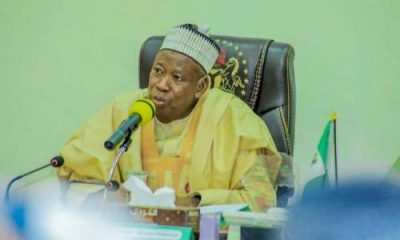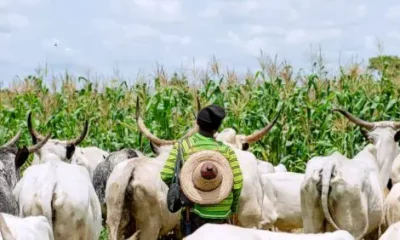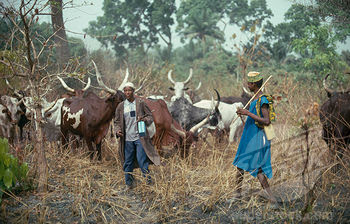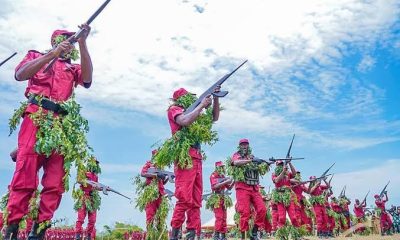News
INVESTIGATIONS: Nigeria’s Southwest Communities Where Fulani Herders And Yoruba Farmers Coexist Peacefully
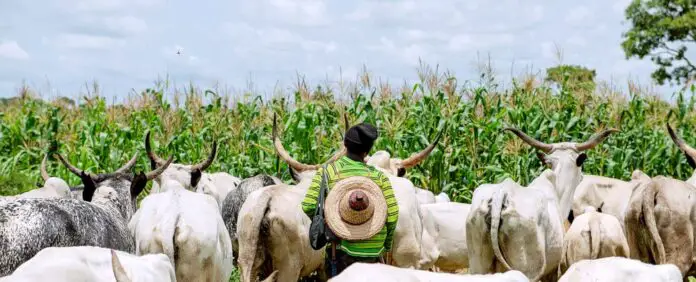
By Kabeer Adeniyi
Many Nigerians have been through hell in the last few years following diverse security challenges including herders-farmers’ conflicts, which have become the order of the day in many regions.
The cause of the crisis is a growing population, depleting resources, cattle rustling, and destruction of farmlands. As farmers complain of cattle destroying their lands, the herders complain that their grazing routes have been encroached on while their cattle are rustled or killed in retaliation for the destruction of farmlands.
The development has consistently led to an unending cycle of attacks and reprisals. It has also graduated to killings and kidnappings on farms and even on major highways.
The first incident involved a prominent Yoruba leader, Olu Falae. The ex-secretary to the government of the federation was kidnapped on his farm in Ondo State in 2015. His abduction generated outrage on social media and despite efforts by security agents, he was not released until N5 million was paid as ransom. He later confirmed that he was kidnapped by six ‘Fulani’ herdsmen.
Aside from Falae’s case, there have been more embarrassing cases and the host communities are already demanding the eviction of Fulanis in their region. In 2019, Olafunke Olakunrin, daughter of Afenifere leader Reuben Fasoranti, was killed while returning to Lagos after a visit to her father in Ondo. Again, her death triggered another round of agitation and the call for Fulani herders’ eviction from southwest communities.
Recall that a regional security network codenamed Operation Amotekun was launched in 2020 by the six governors in the region but not much appears to have changed after many years.
But as reports of conflicts between Fulanis and Yorubas in the Southwest are quick to make headlines, little has been said about the harmony among them.
In Iseyin for instance, Yakubu Kehinde, a Yoruba farmer married Yakubu Bello, the Seriki Fulani of her community. She never believed that love was infectious after many years of being ‘used and dumped’ by different Yoruba men including those that got the blessings of her parents after marriage proposals.
“Seriki Fulani showed me love even after I thought I was not going to have anything to do with men again,” she said.
Five years later, the marriage remains deep in friendship, as she lives with two other wives that are Hausas under the same roof.
When we visited, our reporter saw “love” on Bello’s face as he narrated reasons for peaceful co-existence in Iseyin. He told BattaFiles that he has for years ensured that his kinsmen lived in accordance with the traditions of their hosts, the Yoruba people.
“Our forefathers have been doing businesses together for ages without killings. The reports on the crisis between Yoruba farmers and Fulani herders is sad for me. I know Iseyin as my home. Hence, I do all my best to ensure that we coexist with our hosts peacefully.”
“A farmer is not planting because he or she wants cattle to destroy them. The herder gathering and caring for a herd of domesticated livestock is not also doing so to destroy crops but mistakes happen,” he said. “They are both interested in making money. It is how we resolve the disagreements that determine how long we will live together.”
The Ogboye of Iseyin, Olufunmilayo Odusola, corroborated Bello’s account, saying the “monarch appoints leaders in small-small areas within Iseyin and they are saddled with the responsibility of maintaining orderliness in their axis. They monitor the farms and give us feedback at the palace. There are cases they sometimes find difficult to resolve but the traditional committee in the palace will intervene.”
“We have Fulani leaders who listen to us and they are always in the palace anytime the king summons them for meetings. They even hold key positions here. We are running a secular nation and our constitution provides the right for anyone to live anywhere in the country.”
Aside from Iseyin in Oyo State, many other communities in the Southwest are coexisting peacefully and Fulanis.
One of such is Papalantoro village in the Ewekoro Local Government Area of Ogun State. It is a popular Fulani settlement where herders and their hosts, Yoruba farmers, build houses near each other.
In this community, the children of Fulanis and Yorubas attend the same schools and play together ‘without discrimination’.
While most of the Fulanis spoke the Yoruba language fluently and even ate foods peculiar to the Yorubas. Interestingly, inter-tribal marriage is commonplace in the community.
The traditional ruler of the village, Rasaki Jimoh, said all the herders rearing cattle in the community have identity cards and they do not allow foreign herders to join them.
The palace also warned farmers against attacking the cows of herders. Instead, they are expected to report irregularities to the traditional authorities.
The Fulanis in the community said their tribe of Fulani do not engage in the abduction and killing of innocent citizens, rather they form members of the vigilante group securing the community with their Yoruba neighbours.
There is also a Sadiat community in Osogbo, Osun State where there is unity among Fulanis and Yorubas.
Musa Opeyemi was born in a royal family in Ila-Orangun but she’s currently the wife of a Fulani leader in Sadiat. She has been married since 2007.
Many Nigerians have argued that the best solution to the farmers-herders crisis is to end the open grazing system, an old practice where livestock roam in open fields, plains, and bushes in search of pasture or foliage.
During the period of looking for what to feed on, the herds damage people’s crops, which often leads to conflicts.
-

 News5 days ago
News5 days agoInsecurity: Kogi Schools Resume On Monday
-

 Opinion4 days ago
Opinion4 days agoDon’t Pull the Plug: Why Nigerians Are Pleading for the U.S. to Extend Its Police Training Program — and Why It Must Synergize With New Military Arrivals
-

 Crime4 days ago
Crime4 days agoVigilante Reportedly Shoots Colleague Dead In Plateau
-

 Crime4 days ago
Crime4 days agoMan Shot Dead In Ambush Along Jol-Sho Road In Plateau




